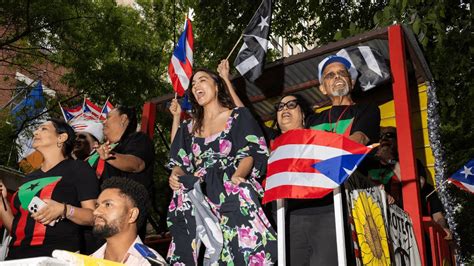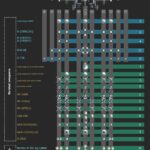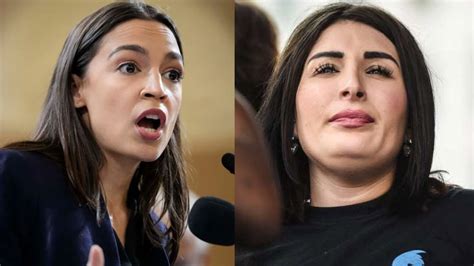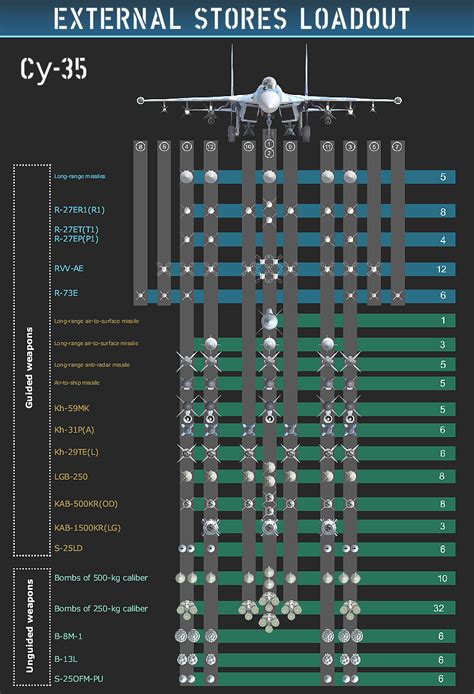
Laura Loomer, a far-right political activist, ignited widespread condemnation after she appeared to body-shame U.S. Representative Alexandria Ocasio-Cortez (D-NY) at the National Puerto Rican Day Parade in New York City on Sunday. Loomer’s remarks, captured in a video that quickly spread across social media, sparked immediate backlash and accusations of sexism and harassment.
The incident unfolded as Ocasio-Cortez, commonly known as AOC, participated in the annual parade celebrating Puerto Rican culture and heritage. Loomer, known for her controversial and often inflammatory rhetoric, positioned herself along the parade route and began filming the congresswoman. In the video, Loomer is heard making disparaging comments about Ocasio-Cortez’s physical appearance, specifically focusing on her weight and attire. She also questioned Ocasio-Cortez’s Puerto Rican heritage.
“AOC is looking thicker,” Loomer stated in the video, which she later shared on her social media platforms, adding comments critical of Ocasio-Cortez’s political stances. The video rapidly gained traction, drawing criticism from a wide range of individuals, including political commentators, activists, and fellow social media users. Many accused Loomer of engaging in blatant body-shaming and perpetuating harmful stereotypes about women’s bodies.
The backlash was swift and intense, with numerous individuals taking to social media to denounce Loomer’s behavior. Critics argued that her comments were not only offensive but also served to distract from important political discussions and issues. Several users pointed out the hypocrisy of Loomer’s actions, given her past criticisms of others for engaging in similar forms of personal attacks.
In response to the controversy, Loomer defended her actions, arguing that she was simply offering an “observation” and that Ocasio-Cortez, as a public figure, should be subject to scrutiny. She also accused her critics of attempting to silence her and stifle free speech. However, her defense did little to quell the outrage, and the controversy continued to escalate.
This incident is the latest in a series of public controversies involving Loomer, who has a history of making inflammatory and often discriminatory statements. She has previously been banned from various social media platforms for violating their policies on hate speech and misinformation. Her actions have consistently drawn criticism from civil rights groups and organizations that advocate for tolerance and inclusivity.
The controversy surrounding Loomer’s remarks highlights the ongoing challenges of maintaining civility and respect in political discourse. It also underscores the need for greater awareness of the harmful effects of body-shaming and other forms of personal attacks. The incident serves as a reminder that words can have a significant impact and that public figures have a responsibility to use their platforms responsibly.
Background and Context
Laura Loomer is a far-right political activist and internet personality known for her controversial views and confrontational tactics. She has gained notoriety for her anti-Muslim rhetoric, promotion of conspiracy theories, and disruptive protests. Loomer has faced numerous bans from social media platforms, including Twitter (now X), Facebook, and Instagram, for violating their policies on hate speech and misinformation.
Her activism often involves targeting individuals and groups she perceives as being opposed to her political views. She has staged protests outside the homes of journalists and politicians, and she has been arrested on multiple occasions for disrupting public events. Loomer’s actions have consistently drawn criticism from civil rights groups and organizations that advocate for tolerance and inclusivity.
Alexandria Ocasio-Cortez is a U.S. Representative representing New York’s 14th congressional district. She is a prominent member of the Democratic Party and is known for her progressive political views. Ocasio-Cortez has been a vocal advocate for policies such as the Green New Deal, Medicare for All, and tuition-free college.
She is also a highly visible figure on social media, where she frequently engages with her constituents and shares her perspectives on political issues. Ocasio-Cortez has often been the target of criticism and attacks from conservative media outlets and political figures. These attacks have often focused on her personal background, her political views, and her physical appearance.
The National Puerto Rican Day Parade is an annual event held in New York City to celebrate Puerto Rican culture and heritage. The parade attracts millions of spectators and participants each year and is one of the largest cultural celebrations in the city. The parade features music, dance, and cultural performances, and it is an opportunity for Puerto Ricans to showcase their pride and traditions.
The parade has been held annually since 1958 and has become an important symbol of Puerto Rican identity and community in New York City. The parade route typically runs along Fifth Avenue in Manhattan, and it attracts participants from all over the world. The parade is organized by the National Puerto Rican Day Parade, Inc., a non-profit organization dedicated to promoting Puerto Rican culture and heritage.
Detailed Analysis
The incident involving Loomer and Ocasio-Cortez raises several important questions about the state of political discourse in the United States. It highlights the increasing prevalence of personal attacks and body-shaming in political debates, as well as the challenges of maintaining civility and respect in an increasingly polarized environment.
Loomer’s remarks about Ocasio-Cortez’s physical appearance were widely condemned as being offensive and inappropriate. Critics argued that her comments were not only sexist but also served to distract from important political discussions and issues. They pointed out that focusing on someone’s physical appearance is a form of personal attack that has no place in political discourse.
The incident also raises questions about the role of social media in amplifying and spreading hate speech. Loomer’s video was shared widely on social media platforms, where it generated a large amount of discussion and debate. While some users defended Loomer’s actions, the vast majority condemned her remarks and called for her to be held accountable.
The controversy surrounding Loomer’s remarks underscores the need for greater awareness of the harmful effects of body-shaming and other forms of personal attacks. Body-shaming can have a significant impact on individuals’ self-esteem and mental health, and it can contribute to a culture of negativity and disrespect. It is important for public figures to set a positive example by refraining from engaging in such behavior.
Furthermore, the incident highlights the challenges of addressing hate speech and misinformation on social media platforms. While social media companies have taken steps to remove some of the most egregious content from their platforms, much of it still remains. This is due in part to the sheer volume of content that is posted online each day, as well as the difficulty of determining what constitutes hate speech or misinformation.
The incident involving Loomer and Ocasio-Cortez also raises questions about the role of the media in covering controversial figures. Some critics have argued that the media should not give a platform to individuals who promote hate speech or misinformation. However, others argue that it is important for the media to report on these figures in order to expose their views and hold them accountable.
Ultimately, the incident serves as a reminder that words can have a significant impact and that public figures have a responsibility to use their platforms responsibly. It is important for individuals to engage in respectful and civil discourse, even when they disagree on political issues. It is also important for social media companies to take steps to address hate speech and misinformation on their platforms.
Quotes from Source
- “AOC is looking thicker,” Loomer stated in the video, which she later shared on her social media platforms.
- The Yahoo News article references the widespread condemnation of Loomer’s actions on social media.
Expanded Context and Implications
The incident between Laura Loomer and Alexandria Ocasio-Cortez transcends a simple case of body-shaming; it represents a microcosm of the broader issues plaguing contemporary political discourse. The willingness of individuals like Loomer to resort to personal attacks, often rooted in sexism and other forms of prejudice, reflects a degradation of civility and a shift away from substantive debate on policy and ideas.
The rise of social media has undoubtedly amplified this trend. While these platforms can facilitate valuable discussions and connect individuals with diverse perspectives, they also provide a breeding ground for misinformation, hate speech, and toxic polarization. The algorithms that govern these platforms often prioritize engagement over accuracy or civility, leading to the proliferation of content that is designed to provoke outrage and division. Loomer’s use of social media to disseminate her comments about Ocasio-Cortez underscores this dynamic. The video quickly went viral, generating a firestorm of controversy and further exacerbating the already tense political climate.
Moreover, the incident highlights the specific challenges faced by women in politics, particularly those who are outspoken and progressive. Women are often subjected to scrutiny and criticism that is disproportionately focused on their appearance, personal lives, and emotional states. This can create a hostile environment that discourages women from entering politics or speaking out on important issues. Ocasio-Cortez, as a young, Latina congresswoman who is known for her progressive views, has been a frequent target of such attacks. Loomer’s comments about her weight and appearance fit squarely within this pattern of sexist and discriminatory behavior.
The response to Loomer’s actions also reveals the growing awareness of the harmful effects of body-shaming and other forms of personal attacks. Many individuals and organizations quickly condemned her remarks, recognizing that they contribute to a culture of negativity and disrespect. This suggests that there is a growing desire for a more civil and constructive political discourse.
However, the incident also underscores the deep divisions that continue to exist in American society. Loomer’s supporters defended her actions, arguing that she was simply exercising her right to free speech and that Ocasio-Cortez, as a public figure, should be subject to scrutiny. This perspective reflects a broader tendency to prioritize individual liberty over the need for civility and respect.
Moving forward, it is essential to address the root causes of this toxic political climate. This will require a multi-faceted approach that includes:
- Promoting media literacy: Individuals need to be equipped with the skills to critically evaluate information and identify misinformation and propaganda.
- Holding social media companies accountable: Social media platforms need to be held responsible for the content that is shared on their platforms and for the algorithms that promote division and hate speech.
- Encouraging civil discourse: Leaders from all sectors of society need to promote a culture of civility and respect and to discourage personal attacks and other forms of harmful behavior.
- Supporting women in politics: It is essential to create a more welcoming and supportive environment for women in politics and to challenge the sexist and discriminatory stereotypes that they often face.
- Demanding Accountability: Those who engage in hateful and discriminatory behavior should face consequences for their actions, whether it be through social condemnation, legal action, or other means.
By taking these steps, we can work to create a more just and equitable society where all individuals are treated with dignity and respect. The incident involving Laura Loomer and Alexandria Ocasio-Cortez serves as a stark reminder of the challenges that lie ahead, but it also offers an opportunity to recommit to the values of civility, tolerance, and inclusivity.
The lack of substantive policy debate replaced by personal attacks underscores a broader societal problem. Loomer’s comments divert attention from important issues and contribute to a climate where reasoned discussion is increasingly difficult. The incident also brings to the forefront the issue of online harassment and the responsibility of social media platforms to regulate harmful content. While free speech is a protected right, it does not extend to harassment or incitement of violence. Social media companies must balance the protection of free speech with the need to create a safe and respectful online environment.
The controversy also highlights the ongoing debate about the role of public figures in shaping social norms. Public figures have a responsibility to use their platforms to promote positive values and to discourage harmful behavior. When public figures engage in body-shaming or other forms of personal attacks, it sends a message that such behavior is acceptable. This can have a particularly damaging effect on young people, who are often highly influenced by the behavior of celebrities and other role models.
FAQ Section
1. What exactly did Laura Loomer say about Alexandria Ocasio-Cortez?
Laura Loomer made disparaging comments about Alexandria Ocasio-Cortez’s physical appearance at the National Puerto Rican Day Parade. Specifically, Loomer stated, “AOC is looking thicker,” and made other comments critical of Ocasio-Cortez’s attire and heritage. These remarks, captured in a video, were widely shared on social media, sparking significant backlash.
2. Why is Loomer’s behavior considered body-shaming?
Loomer’s behavior is considered body-shaming because she made derogatory comments about Ocasio-Cortez’s physical appearance, focusing on her weight. Body-shaming involves criticizing or making negative remarks about someone’s body size or shape, and it is widely regarded as harmful and offensive. It perpetuates unrealistic beauty standards and can contribute to mental health issues.
3. What was the public reaction to Loomer’s comments?
The public reaction to Loomer’s comments was overwhelmingly negative. Many individuals, including political commentators, activists, and social media users, condemned her behavior as sexist, offensive, and inappropriate. Critics argued that her comments served to distract from important political discussions and issues.
4. Has Laura Loomer faced consequences for her actions in the past?
Yes, Laura Loomer has faced consequences for her actions in the past. She has been banned from various social media platforms, including Twitter (now X), Facebook, and Instagram, for violating their policies on hate speech and misinformation. Her actions have consistently drawn criticism from civil rights groups and organizations that advocate for tolerance and inclusivity.
5. What is the significance of this incident in the context of political discourse?
This incident is significant because it highlights the increasing prevalence of personal attacks and body-shaming in political debates. It underscores the challenges of maintaining civility and respect in an increasingly polarized environment. The incident serves as a reminder that words can have a significant impact and that public figures have a responsibility to use their platforms responsibly and avoid such behavior.
6. What were the reasons behind Loomer’s presence at the Puerto Rican Day Parade?
While the exact motivations for Loomer’s presence at the parade aren’t explicitly stated in the provided article, it can be inferred that she attended to confront or provoke a reaction from Ocasio-Cortez, given her history of targeting individuals and groups she opposes politically.
7. How does this incident contribute to the broader discussion about online harassment?
This incident is a clear example of online harassment, where Loomer used social media to disseminate offensive and derogatory comments about Ocasio-Cortez. It amplifies the need for social media platforms to enforce stricter policies against hate speech and body-shaming to protect individuals from online abuse.
8. What role do social media algorithms play in amplifying incidents like this?
Social media algorithms often prioritize engagement, meaning content that elicits strong emotions (positive or negative) is more likely to be widely distributed. In this case, Loomer’s inflammatory comments likely gained traction due to their controversial nature, further spreading the harmful message and contributing to the backlash.
9. What are the potential long-term effects of such incidents on public trust in political figures?
Incidents like this can erode public trust in political figures and the political process as a whole. When politicians and activists resort to personal attacks instead of engaging in substantive debate, it can disillusion voters and contribute to a sense of cynicism about the political system.
10. What can be done to promote more respectful and productive political discourse?
Promoting more respectful and productive political discourse requires a multifaceted approach, including media literacy education, holding social media companies accountable for harmful content, encouraging civil dialogue, supporting women and minorities in politics, and demanding accountability for those who engage in hateful behavior.
11. How does this situation reflect the current state of political polarization in the United States?
The incident between Loomer and Ocasio-Cortez highlights the deep political divisions in the United States. Loomer, a far-right activist, targeting Ocasio-Cortez, a prominent progressive, exemplifies the animosity and lack of civility that often characterize political interactions in the current climate.
12. Are there legal implications for Loomer’s actions, considering the nature of her comments?
While Loomer’s comments may be offensive and inappropriate, they likely do not meet the legal threshold for defamation or harassment. However, the incident raises questions about the limits of free speech and the responsibility of individuals to avoid causing harm with their words.
13. How might Ocasio-Cortez’s political positions contribute to her being a target for such attacks?
Ocasio-Cortez’s progressive political views and outspoken advocacy for policies like the Green New Deal and Medicare for All have made her a frequent target of criticism from conservative media and political figures. Her positions challenge the status quo and often clash with those on the right, leading to increased scrutiny and attacks.
14. What responsibility do news outlets have in reporting on incidents like this?
News outlets have a responsibility to report on such incidents accurately and fairly, providing context and avoiding sensationalism. They should also be mindful of the potential for their coverage to amplify harmful messages and avoid giving undue attention to individuals who promote hate speech.
15. Can this incident be seen as a form of harassment, even if it doesn’t meet the legal definition?
Yes, even if Loomer’s actions don’t meet the legal definition of harassment, they can still be seen as a form of harassment due to the derogatory and personal nature of her comments. Such behavior can create a hostile environment and contribute to a sense of fear and intimidation.
16. What message does this send to young women considering careers in politics?
This incident sends a discouraging message to young women considering careers in politics, highlighting the potential for them to be subjected to sexist and personal attacks. It underscores the need to address the systemic issues that contribute to such behavior and create a more welcoming and supportive environment for women in politics.
17. How does the Puerto Rican Day Parade factor into the significance of this event?
The Puerto Rican Day Parade is an annual celebration of Puerto Rican culture and heritage. Loomer’s decision to target Ocasio-Cortez at this event can be seen as particularly insensitive and disrespectful to the Puerto Rican community. It adds another layer of complexity to the incident, highlighting the potential for political attacks to intersect with cultural celebrations.
18. What steps can individuals take to combat body-shaming and promote body positivity?
Individuals can combat body-shaming by challenging negative comments about appearance, promoting body positivity, and advocating for media that represents diverse body types. It involves fostering a culture of acceptance and respect for all bodies.
19. In what ways can social media platforms improve their moderation policies to prevent similar incidents?
Social media platforms can improve their moderation policies by implementing stricter definitions of hate speech and harassment, using AI and human moderators to identify and remove offensive content, and providing users with clear and accessible reporting mechanisms.
20. How can this incident be used as a teaching moment to promote empathy and understanding in political discourse?
This incident can be used as a teaching moment by discussing the harmful effects of body-shaming, the importance of respectful communication, and the need to challenge prejudice and discrimination in all forms. It can encourage individuals to consider the impact of their words and actions on others.









